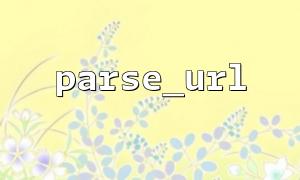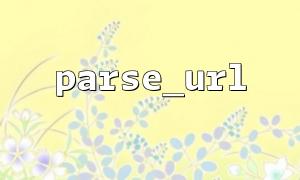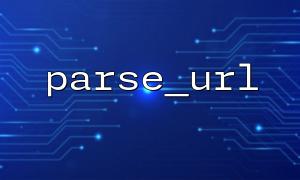In PHP, the parse_url function is used to parse a URL string and return its components, such as protocol, host, port, path, query parameters, etc. This function has undergone some subtle but important changes between PHP 5 and PHP 8, and understanding these differences is essential for writing well-compatible code.
The basic usage of parse_url is as follows:
<?php
$url = "https://gitbox.net/path/to/page?query=123#fragment";
$parts = parse_url($url);
print_r($parts);
?>
After running, it will output:
Array
(
[scheme] => https
[host] => gitbox.net
[path] => /path/to/page
[query] => query=123
[fragment] => fragment
)
It breaks the URL into an associative array to facilitate individual operations on each part.
In PHP 5, parse_url has the following main features:
For URLs with irregular formats, sometimes the parsing results will be inaccurate or even errors.
If the incoming URL is a relative path, such as /path/file , the function may return path or false , depending on the specific version.
When the URL contains uncommon characters or encodings, the parsing results may not be exactly as expected.
Example:
<?php
$url = "http://gitbox.net:8080/path?arg=value#anchor";
print_r(parse_url($url));
?>
Output:
Array
(
[scheme] => http
[host] => gitbox.net
[port] => 8080
[path] => /path
[query] => arg=value
[fragment] => anchor
)
This performs normally in PHP 5, but it is prone to parsing errors when encountering irregular URLs.
PHP 8 has made many improvements to parse_url , mainly including:
PHP 8 is more stringent in URL syntax verification, avoiding some errors that will be ignored in PHP 5. For example, if the URL is incorrectly formatted, parse_url is now more likely to return false or lose part of the parsing results.
PHP 8 has more stable parsing behavior for relative paths and incomplete URLs, avoiding returning inconsistent results.
PHP 8 is more accurate when parsing URLs containing IPv6 addresses, avoiding errors in parentheses in previous versions.
Example:
<?php
$url = "http://[::1]:8080/path?arg=value#anchor";
print_r(parse_url($url));
?>
Output:
Array
(
[scheme] => http
[host] => [::1]
[port] => 8080
[path] => /path
[query] => arg=value
[fragment] => anchor
)
If your code needs to be compatible with PHP 5 and PHP 8, it is recommended to verify the URL format in regular or other ways before using parse_url parsing.
Make rigorous judgments on the parsing results to avoid code crashes because the function returns false or loses certain keys.
When encountering IPv6 addresses or non-standard URLs, it is best to write special processing logic to avoid problems caused by version differences.
| aspect | PHP 5 | PHP 8 |
|---|---|---|
| Syntax Verification | Loose, easy to ignore format errors | Strictly, the wrong format will be exposed earlier |
| Relative URL processing | Possibly return inconsistent results | More reasonable treatment, more stable results |
| IPv6 support | Limited support, error in bracket processing | Support perfect and accurately parse IPv6 addresses with brackets |
| Error return | Occasionally return an error or incomplete array | More explicitly returns false or error message |
In general, PHP 8's parse_url is more robust and strict, and the behavior of using PHP 8 is recommended for projects that require high reliability and security.
If you encounter URL parsing problems in actual development, it is recommended to confirm the currently running PHP version first, write compatible code for version differences, and ensure stable functions.















